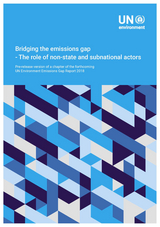
Bridging the emissions gap: the role of non-state and subnational actors - pre-release version of a chapter of the forthcoming UN Environment Emissions Gap Report 2018
Hsu, Angel / Oscar Widerberg / Amy Weinfurter / Sander Chan / Mark Roelfsema / Katharina Lütkehermöller / Fatemeh BakhtiariExternal Publications (2018)
Nairobi: United Nations Environment Programme
MANY NON-STATE ACTORS ARE ENGAGING IN MITIGATION ACTION, ACROSS SECTORS AND REGIONS Non-state and subnational actors have the opportunity both to be part of implementing mitigation commitments made at national level and to go beyond current pledges and raise ambition. The number of actors participating is rising fast: more than 7,000 cities from 133 countries and 245 regions from 42 countries, along with more than 6,000 companies with at least US$36 trillion in revenue have pledged mitigation action. Commitments cover large parts of the economy and are gradually expanding in regional coverage. Many of the actors are cooperating in what are called ‘international cooperative initiatives’. OTHER ACTORS NEED TO JOIN The numbers seem impressive, but there is still huge potential for expansion. Not even 20 percent of the world population is represented in current international initiatives, and most companies around the world still can and need to act. On the finance side, a record of just over US$74 billion of Green Bonds were issued in the first half of this year, but still only represent a very small fraction of the capital markets around the world. EMISSION REDUCTION POTENTIAL FROM NON-STATE AND SUBNATIONAL ACTION COULD ULTIMATELY BE VAST, BUT THE CURRENT IMPACT IS STILL LOW AND HARD TO TRACK The emission reduction potential from nonstate and subnational actors is large. If international cooperative initiatives are scaled up to their fullest potential, the impact could be considerable (up to 15-23 GtCO2e per year by 2030 compared to current policy). If realized this would be instrumental in bridging the emissions gap to “well below 2 degrees Celsius”. However, this pre-release Emissions Gap Report chapter shows that the additional emission reduction contribution made so far by nonstate actors is still quite limited in relation to what countries have already pledged (up to 0.2-0.7 GtCO2e per year by 2030 compared to full Nationally Determined Contribution implementation, and 1.5-2.2 GtCO2e per year compared to current policy). A wider, more comprehensive overview of all non-state and subnational climate action occurring globally is limited by the current low level of available data and lack of consistent reporting on tracking the impact of non-state and subnational climate action. NON-STATE AN SUBNATIONAL ACTORS ARE PROVIDING OTHER CRUCIAL CONTRIBUTIONS THAT GO WELL BEYOND QUANTIFIED EMISSION REDUCTIONS Non-state and subnational actors provide important contributions to climate action beyond their quantified emission reductions. They build confidence in governments concerning climate policy and push for more ambitious national goals. They provide space for experimentation or act as orchestrators in coordination with national governments for climate policy implementation. Initiatives and actors also incentivize, support and inspire additional climate action by exchanging knowledge and good practices, by engaging in advocacy and policy dialogue, by assisting in formulating action plans, and by rewarding and recognizing climate actions. IMPROVING PERFORMANCE AND TRANSPARENCY Non-state actors should ideally adopt more common principles when formulating their actions. Such principles should include clear and quantifiable targets based on relevant benchmarks, technical capacity of the actors, availability of financial incentives, and the presence of regulatory support. Monitoring and progress reporting, which are generally weak at the moment, are essential to document tangible results and gain credibility. Governments can play a vital role by stimulating this growing movement, and can for example support non-state actors by providing collaboration platforms, capacity building and technical and financial resources.
